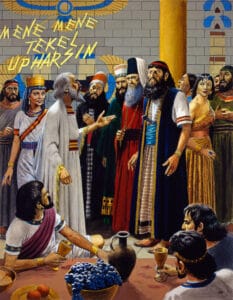Daily Lesson for Tuesday 24th of June 2025
After the city of Nineveh had been humbled (612 b.c.) by a coalition army that included both Medes and Babylonians (led by Nebuchadnezzar’s father), the city of Babylon experienced a revival, the likes of which the city had not seen since the days of Hammurabi, their great lawgiver. Under Nebuchadnezzar, who was now free from the problem of Assyrian raids, the city of Babylon grew in wealth and influence to the point where the neighboring nations had little choice but to grudgingly acknowledge her dominance. She was queen of the world, and nations who wished to prosper declared their loyalty to her.
Meanwhile, as far as we can tell, Nebuchadnezzar died as a believer, professing that Daniel’s God was, indeed, the rightful ruler of all nations (Daniel 4:34-37). The next account that Daniel provides is that of his successor, the vice-regent Belshazzar.
Read Daniel 5:1-31. What important spiritual messages can we take from this account? What ultimately tripped up Belshazzar?
Perhaps the saddest, most tragic part of this account is found in Daniel 5:22. After recounting to the king the downfall and then the restoration of Nebuchadnezzar, Daniel says to him, “ ‘But you his son, Belshazzar, have not humbled your heart, although you knew all this’ ” (NKJV). That is, though he had the opportunity to know truth, though he might have even witnessed firsthand what happened to Nebuchadnezzar, he chose to ignore these events and, instead, embarked on the same course that brought his predecessor so much trouble.
As Nebuchadnezzar had done by erecting the golden statue, Belshazzar was openly defying what Daniel’s God had predicted. By using the temple vessels in a profane manner, he was likely underscoring the fact that Babylon had conquered the Jews and now possessed their God’s religious articles. In other words, they still had supremacy over this God who had predicted their demise.
It was, indeed, an act of total defiance, even though Belshazzar had more than enough evidence, proof, to know better. He had enough head knowledge to know the truth; the problem, instead, was his heart. In the last days, as the final crisis breaks upon the world, people will be given the opportunity to know the truth, as well. What determines their choice, as with Belshazzar, will be their hearts.
 (0)
(0)



